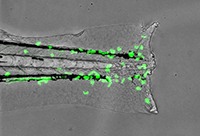Regeneration is a research area that has captivated the imagination of biologists for decades. The field of regenerative medicine is aimed at developing strategies to restore individual cell types, complex tissues or structures that are lost or damaged. This emerging field is approached from two distinct angles. In recent years, stem cell-based models provide a suite of differentiated cells for therapeutic applications. The alternative approach employs the inherent regenerative capacity of nonmammalian models to define the molecular events that permit tissue regeneration. We use the zebrafish as a powerful vertebrate regenerative model because of advances in zebrafish genetics, rapid regeneration time, the ability to obtain vast quantities of externally fertilized eggs, and the ability to modify gene function during development. By understanding the molecular and genetic pathways that coordinately function to accomplish regeneration in this model, we will be in a stronger position to understand why mammals fail to respond to tissue injury with a regenerative response. We use combinations of chemical genetic screening, transcriptomics and gene targeting to help discover the pathways that permit tissue regeneration. We aim to generate therapeutic interventions designed to circumvent limitations in mammalian regenerative capacity.
Regenerative Medicine

